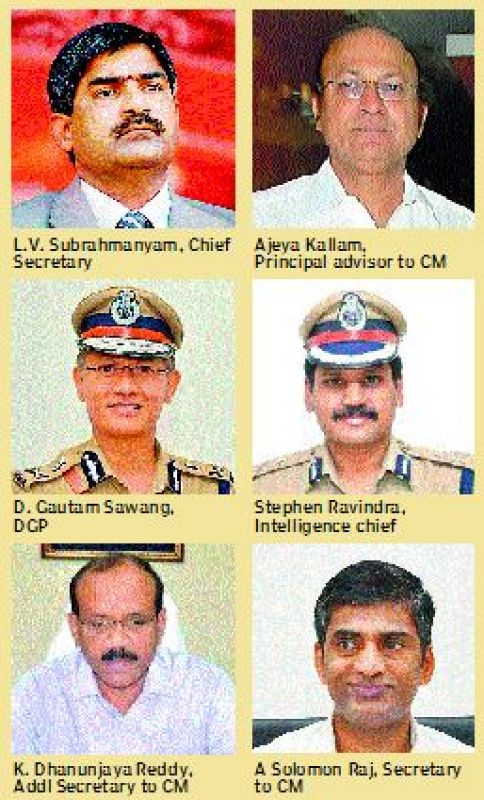Jagan Mohan Reddy’s men
Bureaucrats who once enjoyed tremendous clout find themselves fading into oblivion whenever there is a change of guard at the government level.

They were once the blue-eyed boys of the powers-that-be and enjoyed tremendous clout in both bureaucratic and political circles. Be it IPS officers like R.P. Thakur, A.B. Venkateswara Rao or IAS officer Satish Chandra, their closeness with the “boss” was often the talk of the town with no babu ever thinking of defying them.
But their authority is by no means permanent. In case they are lucky and the same political party who they owe their allegiance to comes back to power, then their clout goes several notches up. But, if there is a change of guard in the State, the immense power they enjoyed over the previous five years, vanishes into thin air and they find themselves completely isolated.
Though it is normal for any new government to replace the bureaucrats close to the previous regime with their own favourites, Andhra Pradesh is witnessing a game of musical chairs involving bureaucracy like never before. And it certainly seems like no one is invincible!
If former DGP R.P. Thakur was seen as former Chief Minister N. Chandrababu Naidu’s blue-eyed boy, his time as a powerful bureaucrat came to an abrupt end with new Chief Minister Y.S. Jagan Mohan Reddy wasting no time in replacing him with a suave Damodar Gautam Sawang as the state police chief.
Thakur was shifted as Commissioner, Printing and Stationary, considered to be a “punishment” posting.

Interestingly, IAS officer Satish Chandra, who was special Chief Secretary in the CMO during Naidu’s tenure, and considered to be a part of Naidu’s “group” was also shifted swiftly. He is currently without a posting and has been asked to report to the GAD (General Administration Department).
But all eyes are on the most powerful bureaucrat during the TDP regime, A.B. Venkateswara Rao, who was the state Intelligence Chief and considered a power centre in his own right. In fact, Naidu fought tooth-and-nail for him after the Election Commission ordered his shift after YSRC members alleged that both he and the then DGP Thakur were partisan. Rao, who was shifted out of ACB, is now without a posting and has also been asked to report to the GAD.
IAS officers G. Sai Prasad, Principal Secretary to the then Chief Minister Naidu, M. Girija Shanker, and A.V. Rajamouli have also met with similar fates.
“Does it not happen in the private sector? It happens on a much larger scale. Only we don’t hear about it because the private sector is not as newsworthy as bureaucratic transfers and therefore, there is no reason to be surprised. Be it a new CM or a CEO, there is always a new team,” says former IAS officer Pradeep Chandra.
There have been quite a few examples in the past wherein the favoured bureaucrats of one regime were at the receiving end of the new regime that followed. Back in the united Andhra Pradesh during the TDP regime, senior IPS officer V. Dinesh Reddy was kept aside and for a long time posted as Additional DGP (Railways).
Similarly, senior IPS officer A. Sivasankar was considered the most powerful bureaucrat under the Naidu regime. Though he was transferred out under pressure after the sensational Alipiri attack on Chandrababu Naidu in October 2003, he was kept away by the Congress government which stormed back to power in 2004. He too was posted as Additional DGP (Railways) for a long time before he finally retired. “He was so powerful that even DGPs used to be wary of him as he was very close to the boss,” recalls a senior officer.
During the Y.S. Rajasekhara Reddy regime too, there were quite a few bureaucrats who enjoyed his patronage. Among them were S.S.P. Yadav, the then DGP who was removed by the Election Commission and replaced by A.K. Mohanty. Interestingly, when YSR returned to power in 2009, on the very first day, he re-appointed Yadav as DGP and sent A.K. Mohanty into an insignificant post as chairman, AP Roads Safety Authority. Incidentally, YSR’s Intelligence Chief K. Aravinda Rao was also considered to be a powerful bureaucrat.

